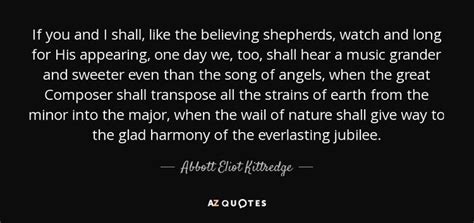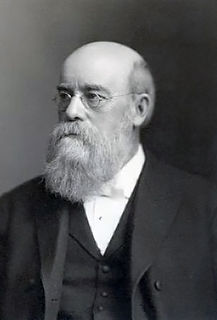A Quote by Swami Vivekananda
There is no salvation for man until he sees God, realises his own soul.
Related Quotes
Whilst a man is persuaded that he has it in his power to contribute anything, be it ever so little, to his salvation, he remains in carnal self-confidence; he is not a self-despairer, and therefore is not duly humbled before God, he believes he may lend a helping hand in his salvation, but on the contrary, whoever is truly convinced that the whole work depends singly on the will of God, such a person renounces his own will and strength; he waits and prays for the operation of God, nor waits and prays in vain
There is One God and One Mediator between God and man, the man Jesus Christ (cf. I Tim. 2:5). For He still pleads even now as man for my salvation; for He continues to wear the Body which He assumed, until He make me a god by the power of His Incarnation; although He is no longer known after the flesh (cf. II Cor. 5:16) ? I mean, the passions of the flesh, the same, except sin, as ours.
Christianity affirms that at the heart of reality is a Heart, a loving Father who works through history for the salvation of His children. Man cannot save himself, for man is not the measure of all things and humanity is not God. Bound by the chains of his own sin and finiteness, man needs a Savior.
This Bible, then, has a mission, grander than any mere creation of God; for in this volume are infinite wisdom, and infinite love. Between its covers are the mind and heart of God; and they are for man's good, for his salvation, his guidance, his spiritual nourishment. If now I neglect my Bible, I do my soul a wrong; for the fact of this Divine message is evidence that I need it.
A man of discernment, meditating on the healing Divine Providence, bears with thanksgiving the misfortunes that come to him. He sees their causes in his own sins, and not in anyone else. But a mindless man, when he sins and receives the punishment for it, considers the cause of his misfortune to be God, or people, not understanding God's care for him.
But the man who is not afraid to admit everything that he sees to be wrong with himself, and yet recognizes that he may be the object of God's love precisely because of his shortcomings, can begin to be sincere. His sincerity is based on confidence, not in his own illusions about himself, but in the endless, unfailing mercy of God.
It is God's earth out of which man is taken. From it he has his body. His body belongs to his essential being. Man's body is not his prison, his shell his exterior, but man himself. Man does not "have" a body; he does not "have" a soul; rather he "is" body and soul. Man in the beginning is really his body. He is one. He is his body, as Christ is completely his body, as the Church is the body of Christ
In this state one enriches everything out of one's own fullness: whatever one sees, whatever wills is seen swelled, taut, strong, overloaded with strength. A man in this state transforms things until they mirror his power—until they are reflections of his perfection. This having to transform into perfection is—art.
There is a fundamental moral difference between a man who sees his self-interest in production and a man who sees it in robbery. The evil of a robber does not lie in the fact that he pursues his own interests, but in what he regards as to his own interest; not in the fact that he pursues his values, but in what he chose to value; not in the fact that he wants to live, but in the fact that he wants to live on a subhuman level.





































